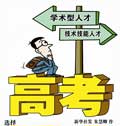第 II 卷 (共47分)
I. Translation
Directions: Translate the following sentences into English, using the words given in the brackets.
1. 他们的建议听起来和我们的同样可行。(as…as)
2. 一到机场,玛丽就发现把护照忘在家里了。(Hardly)
3. 正是他对我们表现的评价,表明我们已经步入正轨了。(track)
4. 我没想到那个曾经受到高度赞扬的钢琴家结果却令观众大失所望。(turn out)
5. 如果不能独立找出提高学习效率的方法,你就很难取得令人满意的成绩。(unless)
II. Guided Writing
Directions: Write an English composition in 120-150 words according to the instructions given in Chinese.
校图书馆在校园网登出广告,拟招聘一名图书管理员助理(the Assistant Librarian),请以Simon Johnson为名写一封求职信,内容必须包括:
● 简述你写信的目的及对该职位的看法
● 说明你的理由,证明你能胜任该职位
(注意:信中不能提及你的真实身份)
Tape scripts and Answers
I. Listening Comprehension
Section A
Directions: In Section A, you will hear ten short conversations between two speakers. At the end of each conversation, a question will be asked about what was said. The conversations and the questions will be spoken only once. After you hear a conversation and the question about it, read the four possible answers on your paper, and decide which one is the best answer to the question you have heard.
1. M: The switch in the bathroom is broken and we need a new one for the light.
W: Why not get Mr. Black to come and take a look?
Q: What is probably Mr. Black?
2. M: I’m looking for a nice dress for my mother. How much is this one?
W: It’s 20 dollars, but you can have it at half price if you buy two.
Q: How much does the man have to pay if he buys two dresses?
3. M: Another rejection letter! Maybe I will never get a good job.
W: Oh, no!
Q: How does the woman feel about the man’s remark?
4. W: What’s the hurry? We’d like you to stay for dinner.
M: Well, thank you. I’d love to. But Mary and I have to meet my parents at the railway station.
Q: What will the man do next?
5. W: Jack must have been joking when he said that he was going to quit his job.
M: Don’t be so sure. He told me that he expects to sell his house.
Q: What conclusion can we draw from the man’s statement?
6. W: How many more cups should we get for the picnic?
M: Don’t we have enough by now?
Q: What does the man imply?
7. W: Does Jerry really want the scholarship he’s applied for?
M: No one wants the scholarship more than Jerry.
Q: What do we learn from the conversation?
8. W: John, how did your maths exam go?
M: I thought I might have failed, but the result was top 10% in the class.
Q: What can we learn about the man from the conversation?
9: M: I haven’t heard from my family since last month.
W: Don’t worry, Bob. Overseas mail is often slow.
Q: What can you learn about the man from the conversation?
10. W: I heard you received the top grade on all four exams this semester.
M: Only on three, I’m afraid.
Q: What does the man mean?
Section B
Directions: In Section B, you will hear two short passages, and you will be asked three questions on each of the passages. The passages will be read twice, but the questions will be spoken only once. When you hear a question, read the four possible answers on your paper and decide which one would be the best answer to the question you have heard.
Questions 11 through 13 are based on the following passage.
In China, people use chopsticks when they eat meals. Chinese people can use chopsticks to eat any kinds of food except soup. They use a spoon to eat soup. They cut the meat into small pieces before they cook it. They do not need to cut the meat up while they are eating, so they can eat their meals with chopsticks.
In the U.S., people use forks, spoons, and knives when they eat. In fact, American people usually eat beef, steak, or chicken. They cook that meat in one whole piece. They need to use knives and forks to cut them up.
Americans use the fork with their left hand and use the knife with their right hand when they cut meat. After they cut it into small pieces, they change the fork from the left hand to the right hand. Then they eat the meat. When Chinese people use a fork and a knife, they feel that their hands are very busy and that this way of eating is too complicated.
11. Why do Chinese people like to use chopsticks?
12. Why do Americans use knives and forks when they eat?
13. What is the main idea of the passage?
Questions 14 through 16 are based on the following passage.
Tom, a reporter friend of ours, passed the large street level windows of the New York Public Library. He noticed that a man on the other side of the window was reading that day‘s newspaper. With delight Tom saw that the paper was open to the very page for which he had written a big article.
The reporter stopped, fixing his eyes on the man. Would the man read deeply into the article? To the bottom of the page? It was one of those rare, unexpected moments of which a writer dreams. The writer‘s nose got closer to the glass. The page wasn‘t turned: good, the reader was interested. Our friend stayed there a bit longer to learn the answer to the important question:
Would the reader turn to the page where the story was continued?
Two minutes passed. Four minutes. Nothing. The man must be a very slow reader indeed. A few moments more and the writer stepped around to look carefully at the reader‘s face, at his eyes. That was when he realized the reader had fallen asleep.
14. Why did Tom stop to look at the man?
15. What did Tom expect the man to do next?
16. What are the man doing while Tom was looking at his face?
Section C
Directions: In Section C, you will hear two longer conversations. The conversations will be read twice. After you hear each conversation, you are required to fill in the numbered blanks with the information you have heard. Write your answers on your answer sheet.
Blanks 17 through 20 are based on the following conversation.
W: Welcome to the Road Office of Canada. Carol speaking. How can I help you?
M: I’d like to have a driving licence. I’m a visiting scholar here.
W: Yes. What you have to do is just visiting your local Road Office.
M: Yes, but I am not a Canadian. I’m from China. I am invited to teach botany in a university for half a year here.
W: Then you should carry an English translation of your Chinese licence if yours is not an international Driving Permit.
M: It’s easy. I can translate it into English all by myself.
W: No. You must have an official translation. In fact you may have it done in your local Road office and pay 40 dollars for the translation.
M: That’s to say, I am permitted to drive if I hold my current Chinese driving licence and the official English translation.
W: That’s right. But that’s only valid for 3 months of time.
M: I see. Thanks.
Listen again, please.
Complete the form. Write ONE WORD for each answer.
Blanks 21 through 24 are based on the following conversation:
M: I’m a business reporter from Time magazine. Thank you for the interview.
W: It’s a pleasure.
M: Would you share with us your first job experience, please?
W: Yes. I acted as the social secretary in the media department of a company.
M: What are your qualifications and where did you study?
W: I mostly learnt on different jobs. I travelled to many cities for work, so all the experience gave me my training.
M: Do you have any advice for young people entering the workforce?
W: Perseverance. I believe routine tasks can turn out to be the best ways of gaining experience.
M: How do you reduce the pressure of your work?
W: I raise a dog and I take him to the office. I love taking him for walks when I am stressed.
M: How do you deal with difficult people at work?
W: I try to be reasonable and sincere even if sometimes someone is really hard to get along with.
M: I don’t think I should occupy too much of your time. Thanks a lot.
Listen again, please.
Complete the form. Write NO MORE THAN THREE WORDS for each answer.
听力测试到此结束,请同学们继续答题。
上一篇:陕西省长安一中、高新一中、交大附中、师大附中、西安中学2014届高三文科综合第三次模拟考试试卷及答案
下一篇:湖南省2014届高三英语十三校第二次联考试卷及答案

 你现在的位置:
你现在的位置: 英语试卷
英语试卷 图片新闻
图片新闻




 热门试卷
热门试卷




